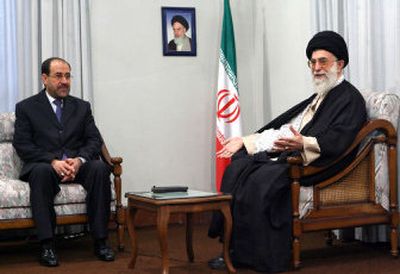Iran says U.S. should leave Iraq

TEHRAN, Iran – Supreme Iranian leader Ayatollah Ali Khamenei told the visiting Iraqi prime minister Wednesday that the way to end instability in Iraq is for U.S. forces to withdraw.
Prime Minister Nouri al-Maliki was on the second day of his first visit to Iran since taking office in May, looking to a close ally of his Shiite-led government for help in calming the violence tearing apart Iraq and in developing Iraq’s troubled oil industry.
He told Khamenei the Iranian government must stop outside influences that are having a “negative” impact on Iraq’s security, the Iraqi leader’s spokesman said.
With Iraq torn by sectarian violence between Shiite and Sunni Muslims, as well as a Sunni-led insurgency, the United States has frequently accused the Iranian regime of interfering in Iraqi politics and allowing insurgents to cross the border. Tehran denies that.
Khamenei told al-Maliki that Iran “considers it an obligation to support the Iraqi government in practical ways,” Iran’s state news agency said.
But Khamenei – who holds the final word in all political matters in Iran – made clear Iran wants to see the withdrawal of U.S. troops, which he blamed in part for the turmoil plaguing Iraq.
“Part of (Iraq’s) sufferings have been due to the actions of the former regime and part is due to the presence of occupiers in Iraq,” Khamenei told al-Maliki, according to the Iranian state news agency and state television.
“We hope a day will come when the Iraqi people reach the stage they deserve and that, by cutting the hands of the foreigners, its wealth will come to serve the Iraqi people,” Khamenei said.
State TV quoted al-Maliki as saying instability was Iraq’s biggest challenge and he blamed the violence mainly on supporters of Saddam’s old regime.
No public mention was made of outside meddling in Iraqi affairs. In Baghdad, however, government spokesman Ali al-Dabbagh said al-Maliki underlined that Iraq wants good relations with Iran, but also that “we don’t want interference in our internal affairs.”